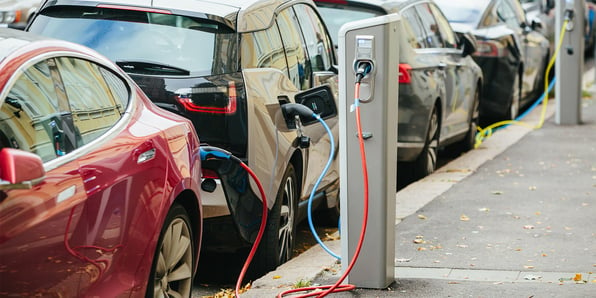

Does your EV charging deployment need better IoT connectivity?
Electric vehicles (EVs) are paving the way for the future of transportation, offering a sustainable and energy-efficient alternative to traditional fossil fuels. Within this exciting shift in transportation, there are several challenges that can be addressed with the help of IoT connectivity. In this blog post, we will delve into these obstacles and explore how connectivity plays a pivotal role in optimising connected electric vehicles.
The EV charging revolution
Charging away from home is a key challenge and opportunity
When EVs were first deployed on roads ten to twenty years ago, manufacturers were primarily concerned with adoption. And for adoption to happen, as many vehicles as possible needed to be on roads.
In addition to these early goals, EV manufacturers were working to provide energy-efficient home charging stations. Now that EVs have become more widely adopted in the last few years, the challenge is no longer the adoption of home charging stations but building the charging infrastructure away from home.
As the number of EVs on the roads continues to rise, the significance of vehicle charging infrastructure becomes even more pronounced. However, deploying a complex charging grid presents its own challenges, such as ensuring availability based on location, addressing maintenance needs, and maintaining connectivity to keep the charging stations operational.
Perfecting connectivity will turn EVs into a 100% clean alternative
As the world shifts towards a more sustainable future, electric vehicles (EVs) are at the forefront of this movement, offering a 100% carbon-neutral alternative to traditional fossil fuel vehicles. With governments like the UK setting ambitious targets to phase out new fossil fuel vehicles by 2030, the importance of EVs and their charging infrastructure cannot be overstated.
To achieve this vision of a greener transportation system, EV charging stations must remain connected and operational on a large scale. Electric vehicles are not just modes of transportation; they are innovative connected solutions constantly evolving alongside advancements in the IoT sector. As we gather more data and explore edge computing applications, the accessibility and reliability of EVs and their charging stations become crucial in deploying these vehicles worldwide.
Why connectivity is fundamental to EV charging
Connectivity plays a crucial role in ensuring that EVs can be efficiently and effectively charged, facilitating a seamless transition to electric vehicles for consumers. By leveraging IoT technology, a network of smart charging stations can be created to provide real-time data, optimise costs, and enable proactive maintenance. This interconnected ecosystem is essential for unlocking the full potential of electric vehicles and moving towards a cleaner, more sustainable future for transportation.
Ensuring timely charging and availability is paramount for EV owners. Suppliers can offer IoT-powered charging stations that deliver various data to drivers to meet their charging needs. These connected charging stations provide real-time updates on availability, location, charging times, cable positions, weather conditions, EV maintenance, payment options, and more.
By integrating connectivity with EV charging stations, manufacturers and station owners can assure EV owners that they will not be left stranded while on the road.
The challenges of global EV charging deployment
Ageing electrical grids
Ageing electrical grids pose a significant challenge in deploying EV charging stations. Many of the current grids are in need of infrastructure updates, as they are either operating at full capacity or close to it, lack clean energy sources, and require expansion.
Revamping, expanding, and transitioning these grids to cleaner energy sources will be a lengthy process involving extensive construction and new agreements with suppliers. Moreover, connecting the charging stations to these grids adds further strain on resources, especially if additional cabling is necessary at the installation site.
Rising energy demands
With current electrical grids operating at or near full capacity, adding EVs will only exacerbate this issue, pushing grids to their limits.
To address this challenge, new sustainable energy sources such as solar, wind and tidal farms must be developed. Regulators and businesses can play a pivotal role in incentivising the expansion and modernisation of existing infrastructure to accommodate this increased demand.
Moreover, network connectivity can further strain energy resources unless powered through LPWA technology, highlighting smart solutions' importance in efficiently managing energy consumption.
Multiple charging standards
As of now, there is no agreed-upon standard for EV charging stations. Different vehicles have different charging station requirements, creating confusion and stumbling blocks at the station.
It will be some time before one charging standard is declared the winner. Until then, stations will need to either provide multiple options or clarify which option(s) they offer. This adds another dimension of data that nearby drivers would be interested in learning before getting to the station.
Implementing IoT solutions for connected EV charging stations
Implementing IoT solutions for connected EV charging stations is a vital step in building the infrastructure for electric vehicles. Among the various ways to make these stations smart, leveraging cellular connectivity offers significant advantages:
Real-time data
IoT connectivity enables the provision of real-time data that enhances the efficiency of EV charging stations in the realm of smart mobility. Drivers can access information on the number of operational stations nearby, check the availability of specific charging points, view weather conditions at the location, determine cable positions, assess charging times, and monitor current and voltage levels.
Cost optimisation and reduction
Global IoT connectivity plays a crucial role in optimising and reducing the costs associated with operating charging stations. It ensures that charging bays are utilised efficiently, provides insights into the strategic deployment of new stations, and facilitates seamless payment options through POS terminals. Reliable connectivity is key to maintaining a stable revenue stream from charging vehicles and enhancing user experience.
Asset monitoring and maintenance
A key benefit of integrating global IoT connectivity into EV charging stations is asset monitoring. Real-time data facilitates predictive analytics by offering insights into the station's current state, grid connectivity, and any software or hardware issues. This proactive approach allows owners and manufacturers to monitor station performance, address potential problems remotely, and minimise operational costs associated with emergency downtimes.
How Velos IoT can assist you with better EV charging deployment
At Velos IoT, we pride ourselves on being at the forefront of providing businesses with cutting-edge IoT solutions. With years of experience and a team of experts dedicated to innovation, we are well-equipped to support the growing EV charging station sector. Our global connectivity ensures that we can offer seamless and efficient solutions to meet the unique needs of our customers.
Through our connectivity management platform, we provide our clients with easy access to the features and information they require most. Whether it's real-time data monitoring, cost optimisation, asset maintenance, or any other aspect of EV charging station management, Velos IoT is here to streamline the process and enhance the overall efficiency of the charging infrastructure.
By leveraging our expertise and technological capabilities, we are committed to driving the transition to electric vehicles and sustainable transportation. With Velos IoT by your side, you can rest assured that your EV charging stations will be equipped with the latest IoT solutions to meet the demands of today's evolving mobility landscape.
Contact us today to learn more about how our IoT solution can help you with better EV charging deployment.
Speak to a Velos IoT expert
Related articles


Choosing the Ideal IoT Partner for Fleet Dash Camera Connectivity
Connected fleet dash cameras are crucial for modern fleet management. They offer valuable insights...

Optimising connected electric vehicles
The future for electric vehicles has never looked brighter. EVs already make up 14% of total...
